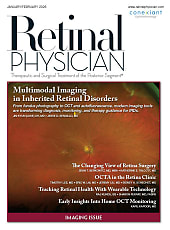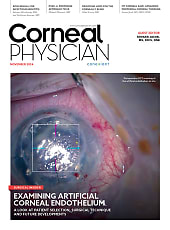Dearest Young Vivienne:
Congratulations on nearing completion of your vitreoretinal surgical fellowship training at Texas Retina Associates! It’s such an exciting time as you’re about to start a new chapter in your life with your new job and family. However, it’s also filled with much anxiety and uncertainty. For the first time, you will not have the constant protection of being under an attending overseeing your every move. Well, I’m writing from 12 years in your future with some advice to help prepare your retina armamentarium.
When I say “armamentarium,” I’m referring to more than just tools of the trade. Yes, carry your favorite scleral depressor at all times and have a good set of lenses, surgical loupes, and the like, but those are minor things. What you really need is to develop your dynamic Team Vivienne so that this team can assemble like superheroes when you are in need. You already know many of the team members, as they’ve helped you get to where you are today. However, to become a successful vitreoretinal surgeon, you’ll need to include both old and new mentors on Team Vivienne.
THE GUARDIANS
The term “mentor” originates from ancient Greek mythology; Odysseus left his son Telemachus under the care of a guardian named Mentor when he had to lead his army in the Trojan War. Mentor was entrusted to impart wisdom to Telemachus and protect him. You’ve had many mentors that helped you through each phase of your life. For this next phase, you may be practicing independently, but these guardians will still be there when you need them.
One of the most important lessons of residency and fellowship was learning when to ask for help. This won’t change in your next career phase, so it’s important to identify which guardians can be there to help when needed. To do this, break down your needs into two areas: professional and personal. Your professional needs include all things related to your career goals, like becoming a clinician, a surgeon, a researcher, a faculty member, and possibly starting your own practice. Your personal needs are those related to marriage and starting a family, maintaining life balance, buying a house, and managing personal investments.
You should not be concerned with how you may be perceived for requesting help, especially in your early career, as it will help you grow. Even today, I still seek second opinions and assistance from my professional guardians. Those whom I ask for advice never view it as a sign of weakness, but rather as an act of maturity founded in respect. At this point in my career, I am evolving into the role of a guardian for other young doctors’ teams, and I always consider it an honor, never a burden.
Some of your guardians will be found among the attendings you want to emulate or partners in the practice you will join. These folks have a personal interest in your success as a reflection of the fellowship program’s reputation or the practice’s growth. However, you’ll meet other future guardians by attending local and national society meetings. You will make personal connections with colleagues who have similar interests, both professional and personal. Invest time into those relationships, as many will experience similar struggles and can share with you how they managed through them. These folks will not only become part of Team Vivienne, they will also be your friends. It will be extremely comforting to know you can easily reach out to them for help in their particular areas of expertise, whether it’s complicated retina surgery, uveitis, ocular oncology, clinical trials, inherited retinal diseases, or other conditions.
As for the personal guardians, these folks will help you define your motivations outside of your career. Your personal guardians might include a few individuals from the professional sphere, but most will be your family or friends. Reconnecting with old friends, with whom you might have lost contact due to the demands of residency and fellowship training, will be therapeutic; they were once close to you for meaningful reasons that will have remained unchanged. Believe it or not, Mom, Dad, and our brother will share valuable insights as you prepare to get married, have a baby, buy a house, and start to actively invest. It’s natural for us to think we know more than our own parents, but remember that their unique life experiences make them invaluable teachers. This is also a time to reach out to your personal guardians for referrals to a good accountant, attorney, realtor, insurance agent, handyman, baby sitter/nanny, financial advisor, gardener, and other professionals. Having designated people with whom you can entrust your valuables, assets, and family welfare is essential for your future, and will prevent a lot of anxiety. (By the way, if you help your accountant’s friend with her retinal detachment, you may get invited to a hockey game as a reward!)
THE LEADER
You are the leader of Team Vivienne. But to manage your team effectively, you must continuously learn and grow. Your fellowship training may be complete, but your professional and personal life training is never truly done. It sounds cliché, but there is so much more personal growth you need to undergo, even at your age, when you feel like you have most things figured out. As the leader, you must constantly train to become the best version of yourself for your patients, family, and friends.
The field of retina will be very different in the next 12 years. While we are still injecting eyeballs every month, advances like gene therapy are just around the corner, so it’s imperative you stay up-to-date! In fact, your first priority will be to prove yourself clinically and surgically in your future practice before you can consider other endeavors.
Conferences and meetings like the American Society of Retina Specialists (ASRS), the American Academy of Ophthalmology (AAO), Vit-Buckle Society (VBS), and the American Retina Forum (ARF) will provide invaluable networking and educational experiences that will enrich your professional life. Participating in these meetings will greatly add to your armamentarium of retina knowledge. As an early career physician, these meetings may be intimidating at first, but I guarantee you that by sticking with it and contributing to the various organizations’ programming and educational efforts, they will soon feel like annual reunions with your friends. In fact, some of these organizations may even ask you to take on leadership positions that you can only dream of today!
The connections that you make at these meetings will eventually lead to the start and growth of your own clinical research program. The study directors will not know you exist unless you attend the meetings and make yourself known. You can’t join the club unless you knock on the door and introduce yourself first. So never burn bridges and always invest in your network.
You’ll eventually be known in the field in a significant way (beyond the glorious ponytail you sport), but that’s only after you have worked hard to demonstrate your ability to take on projects and execute them with an easygoing attitude. Early on, you may feel like some of your efforts aren’t being recognized and appreciated—but they will be. Later on, you will have the honor of being a mentor to the next generation of fellows and early career specialists, who will always remember how you helped them when they were in the shoes you wear now. Just remember how your guardians made you feel when they reached out when you needed them, and helped you become the best version of yourself even when you felt like you didn’t belong. Carry this type of support forward in your mentorship endeavors, as the field can only grow by fostering the success of the next generation.
One other thing—remember your love of running? Remember how you qualified for the Boston Marathon in medical school and never ran it? Well, no more excuses! Get out there and requalify. You will never have time for exercise unless you purposely make time for your physical health. If you don’t, nobody else can do it for you. Also, once you do qualify in 2014, you will see something life-changing: a blind runner being guided by a sighted volunteer. Don’t overlook this opportunity to do the same and combine your passions of running and helping the blind. The adventures and friends you will meet will be incredible!
Also, embrace your unique qualities and share them with the world, because living authentically will help inspire others to do the same. Until now, your life has been scripted by others; the milestones in school, residency, and fellowship were all planned ahead for you. You also felt the pressure of honoring your family through academic success because they risked their lives to come to America as Vietnamese boat refugees. Now, you are on the precipice of a yet-unwritten book for which you are the sole author. Live honestly, and allow all the hopes and dreams you always wanted to achieve to enrich who you are. It may feel scary, vulnerable, or even selfish to think this way, but trust me—you will be better for it, and so will the lives you touch. Aristotle once wrote, “All friendly feelings for others are an extension of one’s feelings for themselves.”
Twelve years from now I promise you will do well and I will be proud of what you’ve become.
Sincerely, your future self,
Vivienne. NRP









